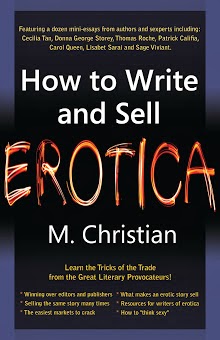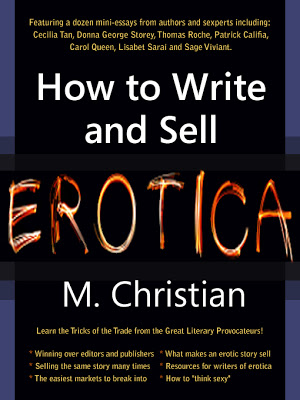Here’s a bit of fun I wrote a looooong time ago … hope you like!

How Much?
The Editor sends the story back, No one comes like this. It’s obvious she’s faking it and I realize he’s right: she was faking it.
#
The Director leans in, hot lights burning my legs: Just can’t get the lighting right, your cock still looks too small. I frown, thinking of all the wankers from San Francisco to Boston feeling good that the stud in their whack-off vid is smaller than they are for once.
#
She never calls me back. Six months later, I run into her on the street. I read that story you wrote for Warped Perverts, she says, scanning for a quick escape route. It scared me.
#
The Photographer tells me to smile, damn it, smile as I lift my leg into yet another impossible position. I miss the gallery opening because of a cramp so bad I can’t get out of bed.
#
Losing my virginity gets published in a book called Cherry Bombed about horrible, embarrassing, first times. I am supposed to get paid $15 and two copies. The check bounces and the book never appears.
#
I can’t sleep for three nights running, the plot of Truck Stop Tranps bogged down in a morass of motivation, character development, and a flawed narrative. I almost miss the deadline, and waste five bucks on Fed Ex changes getting it to the editor in time. When the magazine comes out, I see that he completely butchered the ending, losing the wonderful sense of pathos I had so carefully worked into it. Then I lose four more nights of sleep, shocked wide awake that I actually cared.
#
Where do you get your ideas? she asks in a breathy voice tinged with a boiling horniness as she strokes my cock. I can barely get hard, most of my brain being diverted by my thoughts of she stroked him like a fireman cleaning his pole: diligently, professionally — as if trying to work a gleam out of it…
#
My spell-checker has grown unwieldy from the words I have stuffed in its tight, resistant, pulsing, memory: cocksucker, cunt, mons, asshole, pubes, motherfucker, testicles, dildo, lube, S/M, she-male, latex, jerk-off, cunnilingus, felatio, flagellation, flogger, Saran Wrap, cunt-licker, assfucker, and on and on and on, etc., etc. I run it through a letter to my landlord and broken mail slot becomes she-male slut. Now he looks at me funny and the damned thing never gets fixed.
#
The party is full-swing and banging away: in the sling, guy fists guy – foaming Crisco plopping to the floor. In one corner two dykes are taking turns kicking each other in the butt. Over there a latex dom is turning her slave’s ass into maximus tar-tar. Next to me a grinning piercer expertly punctures some guy’s dick, then feeds steel rings through the holes — and all I can think is poor plot development, crappy characterization, no motivation…
#
She’s a fan. I’ve read everything you’ve ever written, she says. Jerked off to all of them. Talked other playmates into even reenacting some. Raves about me all the time. Box Lunch, Sailors At Sea, Yeeha!, The Bang Gang, TV Repairman … her favorites each and every one. I take my pants off and she’s disappointed. We fuck and she’s disappointed. We each come and she’s disappointed. I tell her: don’t get any rewrites in life, sweetie.
#
The book, magazine, movie comes out. I burst with enthusiasm: I did this, I did this! I become annoying, showing it everyone. Then someone also bursts, and shows it to my mother…
#
Am asked to write about the most degrading, insulting, humiliating, sex act you can imagine and the first thing that comes to mind and out of my mouth is How much?










